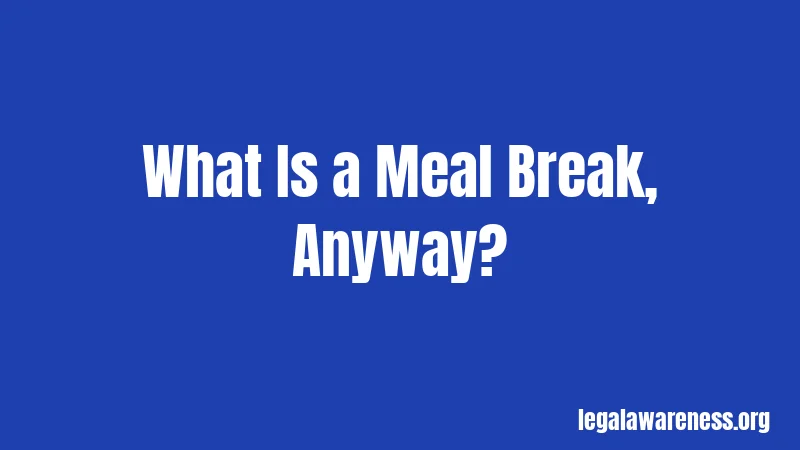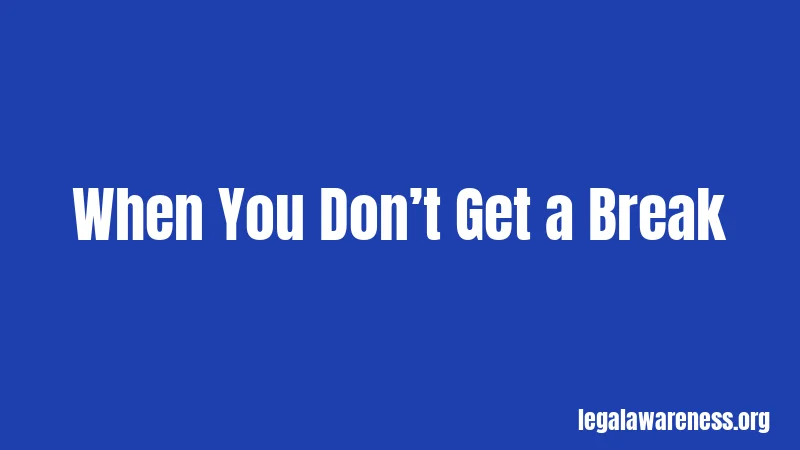Arizona Lunch Break Laws in 2026: What You Actually Need to Know
Think you know the rules about lunch breaks at work? Honestly, most people get this wrong. Arizona has specific laws about meal breaks, and they’re probably different from what you assume. Let’s break down exactly what employers have to do—and what your rights actually are.
The good news? Arizona takes employee breaks seriously. The not-so-good news? The rules can be confusing. But don’t worry, we’ll make sense of it together.
What Is a Meal Break, Anyway?

First things first. A meal break is a break from work where you can leave your job. It’s usually 30 minutes to an hour. You’re not working during this time. You’re eating, scrolling your phone, or just sitting and breathing. That’s the whole point.
This is different from a rest break (which we’ll get to). A meal break is longer. You’re actually free from your employer’s control. Pretty straightforward, right?
The Basic Arizona Meal Break Rule
Okay, here’s where it gets important. Arizona law says that employees who work more than 5 hours in a day must get a 30-minute meal break. That’s it. Thirty minutes. Minimum.
But wait—there’s a catch. Your employer can let you work through your break if you and your employer both agree to it. You have to agree in writing. Just a quick note saying you’re okay with no break. If you write that agreement, your employer doesn’t have to give you the break.
Stay with me here. This is the part that matters most.
When You Don’t Get a Break

Here’s where things get real. If you’re supposed to get a meal break and you don’t, your employer has to pay you for that time. They have to pay you your regular wage for that 30 minutes (or longer, if you worked longer than 5 hours).
Think of it like this: You work 6 hours and skip lunch. Your employer owes you an extra 30 minutes of pay on top of your regular wages.
Not sure if this applies to you? Check your work hours. If you work more than 5 hours and you don’t take a 30-minute break, you’re owed money for that break time.
Rest Breaks vs. Meal Breaks (They’re Different)
Confused about the difference? Let me break it down. A rest break is short. A meal break is long. Arizona law says you need rest breaks too.
For every 4 hours you work, you get one 15-minute rest break. If you work more than 4 hours but less than 8, you get one break. If you work 8 to 12 hours, you get two rest breaks. See the pattern?
Here’s the important part: You cannot skip rest breaks by agreeing with your employer. Rest breaks are mandatory. Your employer must give them to you, period.
Who Has to Follow These Rules?

Honestly, this is the part most people miss. These rules apply to almost all employees in Arizona. Whether you work full-time, part-time, or seasonal, you’re covered.
But there are some exceptions. Agriculture workers have different rules. If you work in certain industries, the rules might be different. If you’re in sales or management, ask your employer about your specific situation.
The bottom line? Unless you work in agriculture or a specific exempt industry, these break rules apply to you.
What If Your Employer Breaks the Rules?
Okay, pause. This is important. If your employer doesn’t give you meal breaks, that’s illegal. If they don’t pay you for missed breaks, that’s also illegal.
You have options here. First, talk to your employer. Sometimes it’s just a mistake. They might not understand the law. Give them a chance to fix it.
If talking doesn’t work, you can file a complaint. Arizona’s Department of Labor has a wage and hour division. They investigate complaints about meal break violations. You can reach out to them.
You can also file a lawsuit. You could sue for unpaid wages plus penalties. This is serious stuff. Employers know better.
Recent Changes and Updates
Wait, it gets better. Arizona’s laws have stayed pretty stable on meal breaks. As of 2025 and 2026, the basic rules haven’t changed significantly. Thirty minutes for shifts over 5 hours. Fifteen-minute rest breaks for every 4 hours.
But here’s what’s important: Judges keep making rulings on how these laws work. Some recent cases have clarified what “working” means. If you’re available to work during your break, even if you’re eating, that might count as working time. Courts are getting stricter about this.
The takeaway? Make sure your break time is actual break time. You should be completely free from work duties.
Special Circumstances and Exceptions
Now, here’s where it gets tricky. Some situations are different. If you work in retail and cover a lunch shift? Your employer still has to get someone to cover for you. You still get your break.
What if your job is impossible to cover? Like you’re the only person working? Your employer still has to try to give you a break. If it’s truly impossible, they have to pay you for it. No breaks for free just because it’s inconvenient.
Personally, I think this rule makes sense. Everyone needs to eat. Everyone deserves a break.
Paid vs. Unpaid Breaks (Here’s What You Need to Know)
This one confuses people. A meal break is usually unpaid. Thirty minutes of break time? Usually unpaid. You’re not working, so technically your employer doesn’t have to pay you.
But here’s the catch: If you’re required to stay on the job, it might be paid. If you can’t leave the building or the job site, that’s not really a break. That might be considered working time.
And remember, if you don’t get your break at all, you’re paid for it. No break time = paid time. That’s the rule.
How to Make Sure You Get Your Breaks
Here’s what you need to do. First, know your rights. If you work more than 5 hours, you’re entitled to a 30-minute break. Period.
Second, speak up. If your employer isn’t giving you breaks, ask about it. Be respectful but clear. “I notice I’m working past 5 hours without a break. When should I take my meal break?”
Third, keep records. Write down your hours. Write down when you take (or don’t take) breaks. This stuff matters if you ever need to prove a violation.
Fourth, if nothing changes, get help. Call Arizona’s Department of Labor. Talk to a lawyer. There are free legal resources in Arizona for employment issues.
What Happens If Your Employer Ignores the Law
So what happens if they break the rules and don’t care? Let’s get specific. Your employer owes you money for unpaid break time. Usually your regular hourly wage for the 30 minutes.
If the violation was intentional, penalties can be higher. We’re talking significant amounts. Not a small fine. Real money.
You could also face other consequences. Wrongful termination claims. Emotional distress claims. This gets serious when employers ignore the law intentionally.
Frequently Asked Questions
Can my employer make me work through lunch? Only if you agree in writing. Even then, they have to pay you for that time. If there’s no written agreement, they can’t make you skip your break.
What if I voluntarily skip my lunch break? You might still be entitled to pay for that break time. The law requires your employer to offer breaks. If you skip it, that’s different from your employer preventing you from taking it.
Do I get paid for rest breaks? Yes, rest breaks are paid. You’re still employed during rest breaks. Your employer must pay you for these 15-minute breaks.
Can my employer change my break time? Yes, they can change when you take your break. They can’t eliminate it or make you work through it without your written agreement and compensation.
What if I work a short shift of exactly 5 hours? The rule is “more than 5 hours.” Exactly 5 hours doesn’t trigger the meal break requirement. But check your employment contract or company policy—some employers give breaks anyway.
Can I take my break whenever I want? Your employer can control when you take your break, within reason. They can schedule it during your shift. But it has to happen if you work over 5 hours.
What about breaks for nursing mothers? Arizona requires reasonable break time and space for nursing mothers. This is in addition to regular meal and rest breaks. Check with your employer about their specific policy.
Do independent contractors get breaks? No. These laws apply to employees only. If you’re classified as a contractor, different rules apply. Make sure you’re actually classified correctly.
Final Thoughts
Here’s what you need to remember: You deserve breaks. Arizona law says so. Thirty minutes for shifts over 5 hours. Rest breaks for every 4 hours of work. No negotiation on rest breaks. Meal breaks can be waived only in writing.
If your employer isn’t following these rules, you have options. Talk to them, report them, or get legal help. Don’t just accept unpaid break time as normal. It’s not.
Now you know the basics. Stay informed, protect your rights, and when in doubt, reach out to the Arizona Department of Labor. You’ve got this.
References
Arizona Department of Labor: Wage and Hour Division – Official resource for employment law questions and complaint filing
Arizona Statutes Section 34-401: Meal and Rest Periods – The actual law governing breaks in Arizona
State of Arizona: Employment Laws Guide – Comprehensive resource for Arizona employment regulations
The Law Offices of Stewart Gagnon: Arizona Wage and Hour Rights – Legal information about Arizona employment laws
Arizona Employment Lawyers Association – Resource for finding legal help with employment disputes
